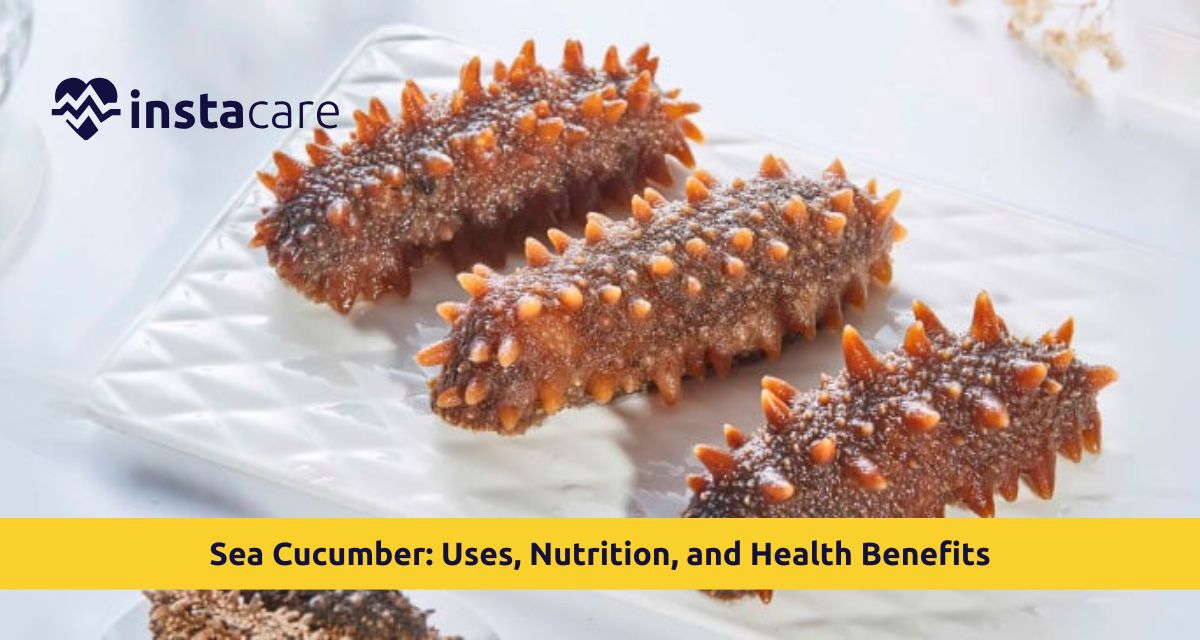What Is a Sea Cucumber?
Sea cucumbers are invertebrate, round-bodied, marine animals belonging to the order Holothuroidea. More than 1,700 sea cucumber species are found on ocean floors all over the world, yet most are not fished by human beings. Sea cucumber harvesting is mostly targeted for Holothuria scabra and Apostichopus japonicus based on texture and nutrient level. Sea cucumbers are important nutrient cyclers and ocean floor habitat producers.
Nutritional Composition of Sea Cucumber
Nutritionally, sea cucumber is very high in value for a very unattractive-looked creature. Sea cucumbers are low in fat and calories but very high-quality protein. The sea cucumber nutrition content has very high-quality minerals like calcium, magnesium, and iron, and anti-disease chondroitin sulfate and mucopolysaccharides.
It is what renders sea cucumber so intriguing that it is collagen-rich. Sea cucumber collagen makes up approximately 70% of their dry body wall weight, a novel marine-source ingredient substitute for conventional collagen targets. Sea cucumber's unique protein structure contains glycine, proline, and hydroxyproline—amino acids critical to connective tissue health.
Health Benefits of Sea Cucumber
Sea cucumber health benefits research continues to lead the way in promising therapeutic applications in many ways:
- Anti-inflammatory Activities: Induction of sea cucumber anti-inflammatory properties was attributed to such bioactive molecules as frondoside A and philinopside E. Supported by research in inhibiting inflammatory markers, such bioactive molecules would be therapeutic in treating such diseases as arthritis and inflammatory bowel disease.
- Joint and Bone Wellness: Natural chondroitin sulfate present in the sea cucumber promotes cartilage as well as eases joint pain. Regular use can enhance mobility and ease osteoarthritis pain.
- Healing of Wounds: Sea cucumber extract consists of growth factors and collagen that promote healing and regeneration of wounds and cause enhanced healing and repair of skin wounds.
- Antimicrobial Activity: Some sea cucumbers are antibacterial and antifungal in nature and contain compounds that can enhance immunity and prevent infection.
- Anticancer Activity: Sea cucumber triterpene glycosides were first reported by initial research as anticancer agents, further human trials required to validate such activity.
Culinary Uses of Sea Cucumber
Sea cucumber is a very good dish in Chinese, Korean, and Japanese cuisine. Sea cucumber processing consists of washing the creatures, boiling and drying them in the sun and thereby firming and gelatinizing it. Sea cucumber uses as a food item include various forms—it's being used to add to soups, stir-fry, and braised meat, enjoyed for their texture and not necessarily for a particular taste.
Raw sea cucumbers are tricky to prepare, but dried and rehydrated sea cucumbers are readily available. It would require a couple of days of rehydrating, depending on how patient one is to get it into the best condition.
Sea Cucumber in Traditional Medicine
Traditional medicine employs sea cucumber of origin very long in Asian medicine. Sea animals were applied by Traditional Chinese Medicine over 400 years ago as medicines for lassitude, arthropathy, and kidney deficiency. Practitioners believe that sea cucumber in traditional medicine give quality initial energy (qi) and blood, revitalize kidneys, and depress dryness.
Some of the foods from the ancients like soups, broths, and concentrates are used to promote energy and longevity. Science only started confirming some of the things claimed back in the ancient days just a few years ago, but social reputation of sea cucumber as medicine food still remains high throughout Asia.
Sea Cucumber in Skincare and Beauty
The sea cucumber has been incorporated into the cosmetic industry to be used on the skin as it is collagen and it can regrow. Sea cucumber for skin extract is being added to premium serums, creams, and masks being marketed as anti-aging.
Sea cucumber antioxidants and collagen will make the skin more elastic, soften fine lines, and hydrate. The creams are claimed to induce cell regeneration, while providing protection for the skin from outside aggressors. With ongoing research in dermatology, there is also anecdotal evidence that sea cucumber is capable of hydrating and inducing cell regeneration in skin.
How to Consume Sea Cucumber Safely?
- Sea cucumber supplements come in capsule, powder, and liquid extract. All are convenient to use. Supplements are only chosen with good companies that provide products which have been third-party tested for purity and potency assurance.
- Possible Side Effects of Sea Cucumber: Not toxic but sea cucumber side effects could cause allergic reaction in some, especially shellfish-allergic people. Could cause stomach discomfort, e.g., diarrhea or nausea, in people who consume more than needed amount. Sea cucumbers are anticoagulant, and patients taking anticoagulant drugs should seek advice from doctors before consumption.
Take low doses to test tolerance, and expectant and nursing women can skip sea cucumber supplements as there are no safety studies done.
Conclusion
Sea cucumber is a great intersection of nutrition, myth, and modern scientific interest. From being a source of collagen and protein to being able to regenerate and respond to inflammation, this marine animal has many functions to health. Regardless of whether taken as nutrition, consumed internally in the form of supplements, or applied externally to the skin as cosmetics, sea cucumber benefits continue to be a precious medicine.
With technology pushing forward ever further and further, we're finding ever more uses for sea cucumbers with properties that are a product of decades of use in the classic sense and making new uses for contemporary health.
Please book an Online appointment with the
best Nutritionist in Lahore, Karachi, Islamabad, and all major cities of Pakistan through
InstaCare, or call our helpline at 03171777509 to find the verified doctor for your disease.

